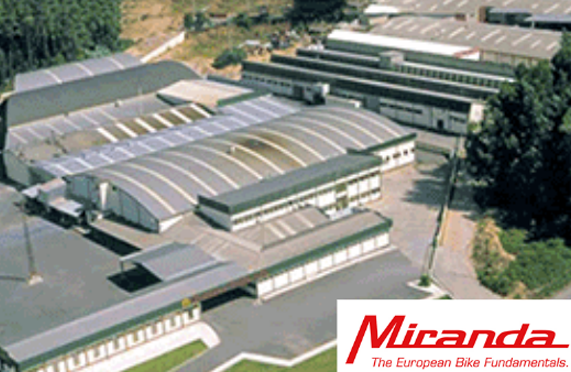MOTORCYCLE AND BICYCLE INDUSTRY
Miranda - a leading supplier for the bicycle OEM market with custom solutions for all the bicycle leading brands. The company has been developing several OEM solutions for the motorcycle and bicycle industries since its incorporation in 1940.
Commitment to surpass expectations as well as the relentlessness about improving quality has led Miranda to search for the new solution in terms of ERP. Sistrade MIS|ERP was chosen due to its flexibility, technological advancement and a large range of features that allow Miranda to manage and monitor all the production and business processes.
Sistrade MIS|ERP is 100% web-based architecture where the user is not dependent on the hardware and operating system. The user can access all the features of MIS|ERP using a laptop, tablet or smartphone, regardless of operating system or browser.
INTERVIEW MIRANDA & IRMÃO, LDA—“Manutenção” Magazine [PDF Full Version-PT]

A close relationship with the internal IT team will be one of the key factors for the implementation's success
On October 14th, SISTRADE organized an event about Industrial Sustainability. There, we met Luís Cardoso, Computer System Manager at Miranda & Irmão, Lda. After presenting the company as one of the successful case studies at the event, Luís Cardoso spoke to "Manutenção" Magazine about the industry, its history and the path Miranda & Irmão is taking on a daily basis towards digital transformation and Industry 4.0.
“Manutenção” Magazine (MM): Miranda & Irmão is an industrial company that produces bicycle components. Do you want to tell us about the company's history?
Luís Cardoso (LC): Miranda was established in 1950 producing bicycle accessories such as horns and air pumps and started expanding from Portugal. In 1960, taking advantage of the motorcycle market boom in Europe and particularly in Portugal, Miranda started manufacturing, leading the production of headlights and taillights, Kms counting, ignition keys, horns and handlebars.
In 1978, plastic injection technology was introduced at Miranda, extending the range of products available to the market, including hydraulic brakes for motorcycles. (...)
In 2000, we acquired the first aluminum stamping machine, which allowed us to increase once again our range of products, namely forged brakes and levers for bicycles. Four years later, we started manufacturing bycicles transmission parts, namely pedals, which became the company's core business. (...)
In 2018, (...) Miranda created the world's first modular pedal, the XMOD, where all parts are completely interchangeable. (...)
Our products are Eco Designed, built to last, using recycled raw materials, finished with sustainable solutions (powder painting, solvent free) and using patented systems that allow a future sustainable recycling (Mgreen).
MM: What are the main products and markets in which you operate?
LC: As I mentioned before our core business is bicycle transmission components. We work with all major bicycle brands and export direct/indirectly almost the entire production, focusing on Central Europe (Germany, Austria, Switzerland, Netherlands, among others).
MM: What made Miranda & Irmão implement Sistrade software?
LC: The need of having an efficient "shop floor" management tool. At the time, our software focused on administrative areas and the production side was also backoffice focused. It was necessary for us to have access to our real-time production data at all times.
MM: As it is increasingly a topic of the day, what has Miranda & Irmão done in terms of Industry 4.0/Digital Transformation?
LC: We have invested in new machinery with the capability to connect with our ERP, in a modern datacenter with advanced security systems and in network infrastructures geared towards Industry 4.0. We have a project in progress for document digitalization and automatic integration processes in the ERP with Sistrade's collaboration. We also have another project, in collaboration with Sistrade, to interconnect all the machines that enable network connection, through systematic data collection, so we can take advantage of AI (Artificial Intelligence), in order to be able to predict events.
MM: SISTRADE's engineering team works with technically complex production fields. Does Miranda & Irmão also have this industrial particularity?
LC: Miranda has multiple manufacturing processes, which makes its production management more challenging due to the complexity involved. We need an adjustable ERP for every situation so it can work as a unit.
MM: SISTRADE has a wide range of Industry 4.0 solutions. Are these software tools aligned with Miranda & Irmão future needs?
LC: Currently, we are running 2 projects in this area and have another 2 to be launched, hopefully, during next year. We aim to control the individual energy consumption of each machine to obtain a more accurate calculation of industrial costs and also to monitor all products circulating in our facilities through RFID.
MM: Has SISTRADE been the right partner for your Digital Transformation/Industry 4.0?
LC: Since the beginning, Miranda invested in a fully integrated system so, it needed a partner, software-house, that guaranteed integration, even in processes that may be different from other industries.
MM: What would you recommend to other companies in this Digital Transformation/Industry 4.0 area?
LC: Regarding the response the IT system has to deliver, which is my area, I recommend working with a team that provides answers in different ERP areas, which you want to be fully integrated and patchless. A close relationship with the internal IT team will be one of the key factors for the implementation's success.
Website: www.mirandabikeparts.com

